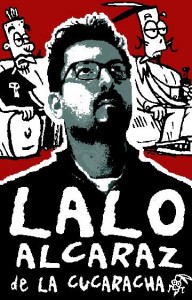Legendary cartoonist Lalo Alcaraz
First Person:
By Al Carlos Hernandez
 Lalo Alcaraz is a nationally syndicated political cartoonist and the creator of La Cucaracha, the daily comic strip. He hosts a radio show called Ponchos Hour of Power at LA’s KPFK radio 90.7.
Lalo Alcaraz is a nationally syndicated political cartoonist and the creator of La Cucaracha, the daily comic strip. He hosts a radio show called Ponchos Hour of Power at LA’s KPFK radio 90.7.
Mr. Alcaraz is considered the most prolific Chicano artist in the nation. He has worked diligently for over twenty years chronicling the political ascendancy of Latinos in America and vigorously pushed the boundaries of Chicano art in the post Chicano art era. His cartoons are pictures that are truly worth one thousand words – words that have provoked and inspired millions of conversations, arguments, and dialogic discussions regarding the state of Latino affairs all over the country.
He is the creator of the first nationally syndicated, politically-themed Latino daily comic strip, “La Cucaracha,” which is seen in scores of newspapers including the Los Angeles Times (syndicated by Universal Press Syndicate, home of “Doonesbury” and “The Boondocks”).
Alcaraz is the co-host of KPFK Radio’s wildly popular and satirical talk show The Pocho Hour of Power heard Fridays at 4 p.m. in L.A. on 90.7 FM. He co-founded the seminal Chicano humor ‘zine, POCHO magazine, and also co-founded the political satire comedy group Chicano Secret Service.
Lalo Alcaraz is currently a faculty member at Otis College of Art & Design in Los Angeles.
Alcaraz is a 1987 graduate of San Diego State University where he received his bachelor’s degree “With Distinction” in Art and Environmental Design. In 1991, he earned his master’s degree in architecture from the University of California, Berkeley. Alcaraz was born in San Diego and grew up on the border. He is married to a hard-working public school teacher and they have three extremely artistic children.
A Lalo fan since his Brown Beret days I talked to Lalo about his life and times.
AC: What was the very first drawing you ever did? Who recognized your potential? How did your parents feel about your art and what did you want to be when you grew up?
LA: I drew an angel for the school Christmas program. (That’s my first published drawing, so to me that counts as the first) Artistic ability runs in the family – got it from my mom’s side. My grandfather was an illiterate farmer and ranchero who could draw architectural plans, then build things.
I suppose I always wanted to be an artist – only thing I was good at!
AC: As you progressed in school, what kinds of things did you draw? What inspired you? At what point did you develop a socio-political awareness?
LA: I drew in class, and then in college I majored in art and was the obnoxious political art student. Imagine an art student with attitude – unheard of! I was hanging with Chicano artists in San Diego, David Avalos and Victor Ochoa, political artist and a muralist; they taught me that making art political was okay and righteous.
AC: How do you define “Chicano?”
LA: politicized Mexican-American – “POCHO” means Pissed Off Chicano Outcast.
AC: What was your high school experience like? What inspired you to go to college and pursue a post graduate degree?
LA: I didn’t enjoy high school but my art teacher, Mrs. Nichols, always showed me that there were art schools out there. She would give me catalogues for prestigious private art schools like Otis-Parsons . . . and now I teach at Otis.
AC: At what point did politics and art converge? Are you an artist or political activist?
LA: I turned political cartoons into protest art in the early 90’s during the racist Prop. 187 era.
AC: You do a cartoon almost every week. Where does the inspiration come from? Don’t you run out of ideas and if you do, where do you get the material?
LA: I do nine tons a week. My inspiration comes from the anger I feel at injustice, hate and discrimination. I got a chip on my shoulder, damn right. Never run out of ideas – not yet anyway.
AC: When did you realize that your political cartoons could cause talk and inspire dialog?
LA: When people would thank me for explaining an issue or giving them the ammo, or just the words, to explain an issue to someone else. And also the countless teachers who use my comics in college and high school classes to bring up current events and issues.
AC: Would you consider yourself an instigator, educator, or innovator?
LA: I don’t know. Maybe a little of all three.
AC: Has a newspaper ever dropped your strip because they didn’t agree with your politics? How would you feel about that?
LA: Censorship of the marketplace. I think that’s the way to describe it.
AC: You and your work have been featured on all the major networks and around the world on various media platforms. What is your greatest victory so far? Greatest disappointment?
LA: Bringing down the Soviet Union – just kidding. I have been generously covered and I am happy about that. I could always use a little more TV exposure!
AC: When people look back on your work, what do you want them to feel?
LA: ANGER that makes them want to change the world!
AC: Where can people check out your work?


 Arturo Castañares
Arturo Castañares



